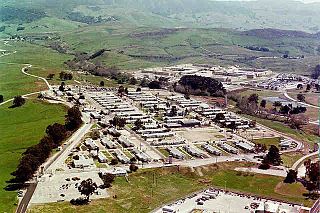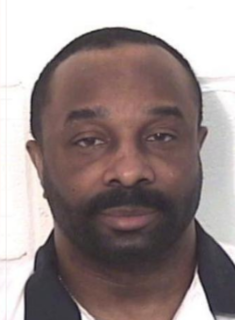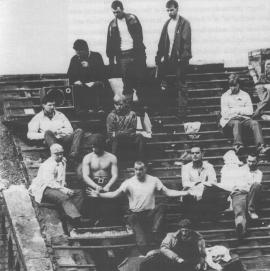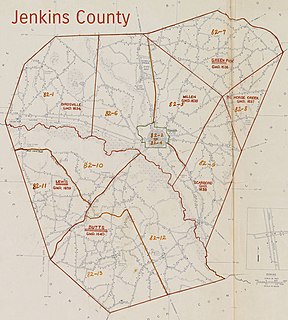
Lester Garfield Maddox Sr. was an American politician who served as the 75th Governor of the U.S. state of Georgia from 1967 to 1971. A populist Democrat, Maddox came to prominence as a staunch segregationist when he refused to serve black customers in his Atlanta restaurant, in violation of the Civil Rights Act of 1964. He later served as Lieutenant Governor during the period when Jimmy Carter was Governor.

California Men's Colony (CMC) is a male-only state prison located northwest of the city of San Luis Obispo, San Luis Obispo County, California, along the central California coast approximately halfway between Los Angeles and San Francisco.

The Black Liberation Army (BLA) was an underground Black Power organization that operated in the United States from 1970 to 1981. Composed entirely of Black Panthers (BPP) who served as members of both groups, the organization's program was one of war against the United States government, and its stated goal was to "take up arms for the liberation and self-determination of black people in the United States." The BLA carried out a series of bombings, killings of police officers and drug dealers, robberies, and prison breaks.

Ellis Gibbs Arnall was an American politician who served as the 69th Governor of Georgia from 1943 to 1947. A liberal Democrat, he helped lead efforts to abolish the poll tax and to reduce Georgia's voting age to 18. Following his departure from office, he became a highly successful attorney and businessman.

Howard Hollis "Bo" Callaway Sr. was an American politician and businessman from the state of Georgia. He worked with his family to develop what is now Callaway Gardens in Pine Mountain, Georgia and owned Crested Butte ski resort in Colorado.
Brian Gene Nichols is known for his escape and killing spree in the Fulton County Courthouse in Atlanta, Georgia, on March 11, 2005. Nichols was on trial for rape when he escaped from custody and murdered the judge presiding over his trial, a court reporter, a sheriff's deputy and later a federal agent. Twenty-six hours after a large-scale manhunt was launched in the metropolitan Atlanta area, Nichols was taken into custody. The prosecution charged him with committing 54 crimes during the escape; and he was found guilty on all counts on November 7, 2008.
Demetrios John "Mitch" Skandalakis is a lawyer and former American Republican politician from Georgia who rose quickly to national prominence in the early 1990s. He upset Martin Luther King III to become chairman of the Fulton County Board of Commissioners, and in 1998, was the unsuccessful Republican nominee for Lieutenant Governor of Georgia. Afterward, he became subjected to a wide-ranging federal corruption investigation of Fulton County government and admitted lying to an FBI agent. He was disbarred, but was later reinstated, as an attorney.

Thomas Bailey "Tom" Murphy was an attorney and American politician from the U.S. state of Georgia. Murphy was the Speaker of the Georgia House of Representatives from 1973 until his defeat in the general election of 2002, making him the longest serving House Speaker of any U.S. state legislature. He was a member of the Democratic Party.
Gary Stephen Krist is an American convicted of kidnapping and the trafficking of illegal aliens.

In 1969, the United States FBI, under Director J. Edgar Hoover, continued for a twentieth year to maintain a public list of the people it regarded as the Ten Most Wanted Fugitives.
Robert Elliott Burns was a World War I veteran who gained notoriety after escaping from a Georgia chain gang and writing his memoirs, I Am a Fugitive from a Georgia Chain Gang!, exposing the cruelty and injustice of the chain gang system.

Javaris Cortez Crittenton, is an American former professional basketball player. During his four year career, Crittenton played for the Los Angeles Lakers, Memphis Grizzlies, and Washington Wizards of the National Basketball Association (NBA), the Zhejiang Lions of the Chinese Basketball Association, and the Dakota Wizards of the NBA D-League. He was previously the starting point guard for the Georgia Tech men's basketball team.

Lynn Turner, born Julia Lynn Womack, was an American convicted murderer. In 1995, her husband, Glenn Turner, died after allegedly being sick with the flu. In 2001, the death of what had been described as her common-law husband, Randy Thompson, under remarkably similar circumstances, aroused the suspicion of law enforcement. After investigation, it was determined by authorities that Lynn Turner had murdered both her husbands by poisoning them with ethylene glycol–based antifreeze. She was tried for Glenn Turner's murder in 2004. She was found guilty and went to trial again for murdering Randy Thompson in 2007, ultimately being convicted. Turner died in prison on August 30, 2010. The cause of death was an apparent suicide by toxic overdose of blood pressure medication.

Carlton Michael Gary was an American serial killer convicted of the murders of three elderly women in Columbus, Georgia, between 1977 and 1978, though he is suspected of at least four more. Gary was arrested in December 1978 for an armed robbery and sentenced to 21 years in prison.
Paul "Dingus" Magee is a former volunteer in the Belfast Brigade of the Provisional Irish Republican Army (IRA) who escaped during his 1981 trial for killing a member of the Special Air Service (SAS) in 1980. After serving a prison sentence in the Republic of Ireland, Magee fled to England where he was imprisoned after killing a policeman in 1992. He was repatriated to the Republic of Ireland as part of the Northern Ireland peace process before being released from prison in 1999, and subsequently avoided extradition back to Northern Ireland to serve his sentence for killing the member of the SAS.

The 1990 Strangeways Prison riot was a 25-day prison riot and rooftop protest at Strangeways Prison in Manchester, England. The riot began on 1 April 1990 when prisoners took control of the prison chapel, and the riot quickly spread throughout most of the prison. The riot and rooftop protest ended on 25 April when the final five prisoners were removed from the rooftop, making it the longest prison riot in British penal history. One prisoner was killed during the riot, and 147 prison officers and 47 prisoners were injured. Much of the prison was damaged or destroyed with the cost of repairs coming to £55 million.
The Baldwin State Prison, previously the Baldwin Correctional Institution and the Georgia Women's Correctional Institution (GWCI), is a prison located in Milledgeville, Georgia, United States. The prison has a capacity of 900. After complaints in the early 1990s by more than 200 women of sexual abuse by guards, an investigation was conducted. More than a dozen guards were prosecuted. The state decided to move the women to other prison facilities for a total change in culture. This facility now houses only adult male felons, with a capacity of 992.

Metro State Prison, previously the Metro Correctional Institution, is a former Georgia Department of Corrections prison for women in unincorporated southern DeKalb County, Georgia, near Atlanta. Female death row inmates were held in the Metro State Prison. The prison had room for 779 prisoners. It was closed in 2011.

Richard William Matt was an American murderer known for several prison escapes, most notably the 2015 Clinton Correctional Facility escape.

The Jenkins County riot of 1919 took place on Sunday, April 13, 1919, when a series of misunderstandings and out-of-control events spiralled into two white police officers being killed. In retaliation the local white community formed mobs and ravaged the black community, burning black community buildings and killing at least four people.













